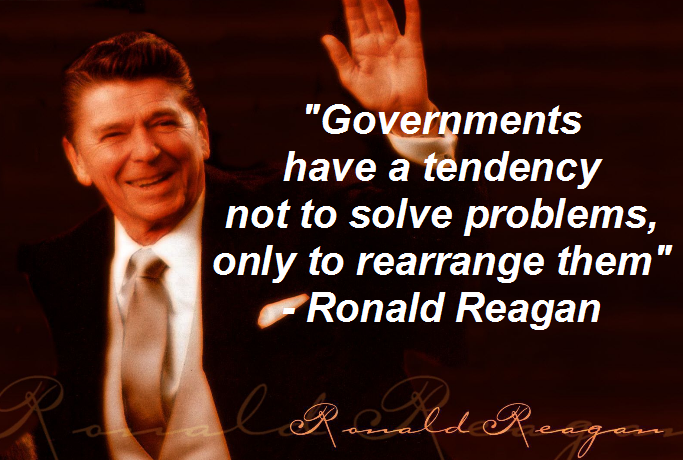
"Faith, Hope, Charity And Divine Desperation"
"Do Republicans Do Anything But Piss, Moan, Bitch, Whine?"
Disillusioned With The Future, People have lost faith with companies and governments
Lawrence Summers is a professor at and past president of Harvard University. He was treasury secretary from 1999 to 2001 and economic adviser to President Obama from 2009 through 2010.
Walk from the US Airways shuttle at New York’s LaGuardia Airport to ground transportation. For months, there has been a sign saying “New escalator coming in Spring 2015.” The Charles River at a key point separating Boston and Cambridge is little more than 100 yards wide. Yet traffic has been diverted for over two years because of the repair of a major bridge and work is expected to continue into 2016.
The world is said to progress, but things that would once have seemed easy now seem hard. The Rhine is much wider than the Charles, yet Gen. George S. Patton needed just a day to create bridges that permitted squadrons of tanks to get across it. It will take almost half as long to fix that escalator in LaGuardia as it took to build the Empire State Building 85 years ago.
Is it any wonder that the American people have lost faith in the future and in institutions of all kinds? If rudimentary tasks like keeping escalators going and bridges repaired are too much for us to handle, it is little wonder that disillusionment and cynicism flourish.

Social Security? Medicare? State Universities? Roads and Highways? Sewers? Water Supplies? National Parks? National Guard? Coast Guard?
"Future Generations Will Despise Ronald Reagan. Here's Why"
Political debates are often framed in terms of the respective roles of the public and private sectors, with progressives stressing private market failure and conservatives stressing the dysfunctionality of the public sector. The sad truth is that there is merit in both perspectives.
The escalator that will take five months to repair is privately owned. Although it is in an airport, failure cannot be blamed on public authorities. Necessary maintenance had been delayed for years — with the escalator in question even being stripped for spare parts to support other escalators. Now, the new owner has many priorities; the replacement of the escalator system is only one.
On the other hand, repair of the bridge across the Charles is the responsibility of local governments. A combination of budgetary short-sightedness, excessively rigid labor practices and a failure to take account of the costs of traffic delays appears to account for the project’s remarkably long gestation.
While much political debate takes place on a macro level, focusing on large-scale changes in spending, tax or regulatory policies, I suspect that much of what frustrates the public happens on a more micro scale. A government that has to install nets under bridges to catch falling debris will not inspire confidence when it aspires to rebuild other nations. When major companies cannibalize their machinery for spare parts, it is hardly surprising that they are not trusted to embark on voluntary long-run programs to control greenhouse gases, promote diversity or develop technologies.
What is to be done? First, the focus of infrastructure discussions needs to shift from major new projects whose initiation and completion can be the occasion for grand celebration to more prosaic issues of upkeep, maintenance and project implementation. For example, before anyone contemplates spiffy new high-speed rail systems, consideration should be given to repairing existing lines and stations.
Second, accountants in the public and private sectors need to develop methodologies for capturing the cost of deferred maintenance and show this in financial accounts for what it is — borrowing from the future. What is counted counts. If maintenance deferrals were made transparent, they would become much more expensive for decision makers.
Third, the public, and the media on its behalf, need to be much less accepting of institutional failure. It has been said that we do not want to know all to which we can become accustomed. A vicious cycle in which governments perform poorly, and so are starved of resources, and so perform worse is a serious threat to healthy democracy. Something similar can happen to business. If owners distrust management, they will insist on taking cash out rather than permitting its use for long-term investment. The only answer is prompt and aggressive responses to failure that ensure that it is short-lived.
More important than any specific remedy, there is a reason beyond the media and the public’s own economic problems that there is so much disillusionment with so many institutions. They do not seem to perform as well as they once did. We see it every day. Fixing escalators and building bridges may seem like small stuff at a time of economic crisis and geopolitical instability. But it is time we recognize the importance of what may seem small to what is ultimately important — the faith of citizens in their collective future.

Alan: Ronald Reagan gave birth to the cynicism that lies at the heart of American politics.
"Future Generations Will Despise Ronald Reagan. Here's Why"
***
"The masses" respond to Ronald Reagan's "leadership."
No comments:
Post a Comment